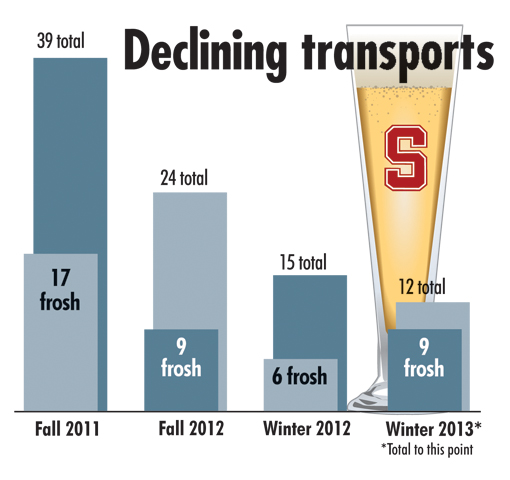After an increase in alcohol-related incidents among freshmen at the beginning of winter quarter, Director of the Office of Alcohol Policy and Education (OAPE) Ralph Castro and Dean of Freshmen Rob Urstein sent out an email during Parents’ Weekend warning the freshman class about the consequences of dangerous drinking behavior. Administrators have struck a more optimistic tone, however, when reviewing the academic year to date.
According to Castro, the email was meant to remind students of the University’s stance on high-risk drinking and revisit some of the topics discussed during New Student Orientation (NSO) regarding alcohol use.
“We just wanted to keep it fresh in their minds and reiterate our message around responsible use and making good decisions and things like that,” Castro said.
Though freshmen alcohol transports decreased during fall quarter compared to recent years, the email stated that freshmen have been “injuring themselves with alcohol more and more frequently” in recent months and noted that freshmen regularly face legal proceedings for offenses like public intoxication.
Sam Saenz ’11, outreach and internship coordinator for OAPE, said that the increase in alcohol-related incidents during winter quarter was surprising. Historically, those numbers typically peak in the fall and are lowest in the winter.
“It’s something we normally don’t expect,” Saenz said. “It definitely caught us off guard when we saw the numbers increase, and we’re not quite sure as to what happened.”
However, Kenny Johnson ’14, a resident assistant in Burbank, said that the increase in winter quarter incidents was not unprecedented.
“Winter quarter can kind of be a time where kids can be more confident with their drinking, and it’s just more stressful,” Johnson said.
While Castro expressed concern over the increasing number of alcohol-related incidents this quarter, he noted that freshman transport numbers are still relatively low compared to last year’s numbers.
Castro credited this decrease in part to some of OAPE’s new initiatives, including greater outreach to freshmen dorms, new party planning policies and training, the alcohol-free social events offered by the Cardinal Nights program and the Cheers OAPE iPhone app.
“One of the things we have really been trying to work on is changing the culture that you need alcohol to have fun all the time,” Castro said. “Can you have fun when you drink alcohol? Absolutely. Do you need alcohol to have fun? No.”
Johnson agreed that the Cardinal Nights program, which has hosted trips to Build-A-Bear Workshop, Redwood Roller Rink and Laser Quest, among other locations, has been very effective.
“The underlying issue is that there is just not things to do on campus necessarily,” Johnson said. “For some kids the only attractive option is to drink and go out, whereas things like going to Sky High or going to movies, that’s awesome.”
However, Johnson questioned whether or not some of OAPE’s other initiatives are successful in reducing dangerous drinking behavior.
“I think the party planning workshop has good intentions, but it needs to be worked on,” Johnson said. “It’s a hard thing because there’s a difference between knowledge and practice, especially with something like drinking.”
Castro recently attended an Undergraduate Senate meeting with OAPE Assistant Directors Angelina Cardona ’11 and Jarreau Bowen ’07 M.A ’08 to solicit feedback from students like Johnson. According to Castro, this feedback will be used to adjust OAPE’s programs going forward.
Castro will also teach a four-unit alcohol studies class during spring quarter, called Alcohol Issues and Campus Culture. According to Castro, the course has been offered “off and on” for the past 10 years, with enrollment fluctuating between 10 and 50 students.
Saenz, who will be a teaching assistant for the course, said that students are expected to investigate the alcohol culture on campus, collect data and develop ideas for projects that tackle the issue of high-risk drinking behavior.
According to Saenz, these ideas could be incorporated into new programs or policies for OAPE in the future.
“Our main focus is to continue the good work that’s been happening this year,” Saenz said. “We want to make sure we keep that up, so I think that’s really what we’re trying to do with the letter.”
